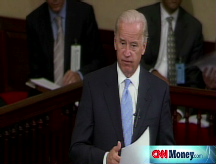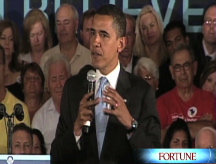The new, new brand of democratic politics
At its convention in Denver, the Democratic Party tops the centrist economic policies of the Clinton Administration with a Big Government approach to the country's big problems.

DENVER (Fortune) -- Sixteen years ago, Bill Clinton led his exiled party back to the White House by pointedly rejecting post-'60s liberalism and promised a "new brand of Democratic politics." But today, as the delegates convene here for their 2008 convention, the Democratic Party has shifted to an economic direction best described as "center left."
The fierce battles between New Democrat centrists and old-style liberals that defined the Democratic Party in the 1990s are long gone, with the party unified behind Barack Obama's economic agenda of universal health care, expensive federal programs and more regulation of the financial markets.
"The party is still proud of its fiscal direction in the Clinton years," says veteran campaign scholar Thomas E. Mann of the Brookings Institution. "Barack Obama feels obliged to pay lip service to it. But there is no sense that this is the highest priority."
At the 1992 convention, and again in 1996, party liberals bristled at the Clinton centrists' calls for a leaner government and a balanced budget, for "ending welfare as we know it" and putting more cops on the streets. The left was willing to back Clinton only because it meant victory. "America has shifted on us," New York Rep. Charles Rangel complained during the 1996 convention, just months after President Clinton declared the "era of big government is over." "Americans should be prepared to raise the taxes, invest in productivity, and create the jobs. But they can't support that. They'd rather cut taxes, invest in defense and build jails."
Fast forward to 2008, and it's hard to find complaints about Obama's economic direction from the party's left-progressive scholars, netroots activists, union leaders, and the like. There is still grumbling over the Illinois senator's support of legislation approving secret wiretapping to combat terrorism, but on economics, the party's base is solidly behind a more activist federal government.
The real emotional divide inside the party this week centers on Obama's refusal to put Hillary Clinton on his ticket. (Her supporters plan a protest in downtown Denver tomorrow.) This, however, is about loyalty, and a belief that Obama is too inexperienced to be president. It should not be mistaken as a divide over policy.
Indeed, on some issues, Clinton tacked slightly to the left of Obama. She was the first and most vocal Democratic candidate to sound the protectionist bell during the primaries, and her healthcare program - by mandating coverage for individuals - involves more government control than Obama's. A convention with Clinton on the top of the ticket wouldn't look much different on economic policy.
Obama doesn't think of himself as an old-school liberal. He has praised President Reagan's challenge to the stale bureaucracies of the '70s, and in a June interview with Fortune he embraced free markets and insisted he "is a pragmatist, not an ideologue."
The centerpiece of Obamanomics - raising taxes on high earners and investors and lowering them on the middle class - is attacked by free-marketers for penalizing economic success and possibly further stalling economic growth. Obama says he is simply returning the country to the tax rates of the Clinton era and correcting a tax code that has exacerbated a trend toward stagnant middle class incomes and a growing wealth gap.
But the presumptive Democratic nominee's populist, anti-corporate rhetoric - and his condemnation of trade agreements, including Clinton's very own NAFTA - plant him firmly to the left of the New Democrats of the '90s. He wants to penalize companies that "ship jobs overseas" and offer tax rewards to companies that stay in the U.S. and support unionization efforts.
He is also more comfortable than the New Democrats were with large-scale government spending programs, proposing some $50 billion to rebuild the nation's infrastructure, invest in alternative energy and support scientific research.
Do the centrists who fought on the front lines during the Clinton era mind? For the most part, no. Just look at the title of a recent article by one the New Democrats' most stalwart soldiers, Clinton policy adviser William Galston: "How Big Government Got Its Groove Back."
Galston argues that the party has moved to the left - embracing a more activist federal government - because facts on the ground have changed. Just as Rangel noted that America "shifted" on liberals in the 90s, so now have the public mood has shifted on centrists.
Globalization is stirring widespread economic anxiety, and middle class incomes have stagnated while a class of super-rich has emerged. "The experience of most people is one of stagnation and struggle," says Galston.
Events like Hurricane Katrina and the Minnesota bridge collapse suggest a national infrastructure that has suffered from lack of tending. "There has been an orgy of private consumption but a deficit of public investment," he argues.
As for the Democrats' populist, anti-corporate rhetoric: Party analysts tick off a string of corporate misdeeds, from Enron to the subprime mortgage debacle, to make the case that Obama's words reflect the headlines.
On economics, the Democratic Party is remarkably united heading into the 2008 election. "The mother of all policy battles in the '90s, that between the two Bobs - [liberal Labor Secretary] Bob Reich and [centrist Treasury Secretary] Bob Rubin - is behind us," insists Galston.
-
 The retail giant tops the Fortune 500 for the second year in a row. Who else made the list? More
The retail giant tops the Fortune 500 for the second year in a row. Who else made the list? More -
 This group of companies is all about social networking to connect with their customers. More
This group of companies is all about social networking to connect with their customers. More -
 The fight over the cholesterol medication is keeping a generic version from hitting the market. More
The fight over the cholesterol medication is keeping a generic version from hitting the market. More -
 Bin Laden may be dead, but the terrorist group he led doesn't need his money. More
Bin Laden may be dead, but the terrorist group he led doesn't need his money. More -
 U.S. real estate might be a mess, but in other parts of the world, home prices are jumping. More
U.S. real estate might be a mess, but in other parts of the world, home prices are jumping. More -
 Libya's output is a fraction of global production, but it's crucial to the nation's economy. More
Libya's output is a fraction of global production, but it's crucial to the nation's economy. More -
 Once rates start to rise, things could get ugly fast for our neighbors to the north. More
Once rates start to rise, things could get ugly fast for our neighbors to the north. More












